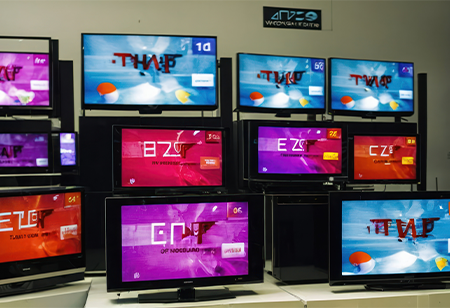Disney and DirecTV Clash Over TV Bundle Reforms
What started as standard negotiations over the distribution fees DirecTV would pay for Walt Disney’s television networks is evolving into a pivotal debate about the future of bundled programming, according to executives and experts.
DirecTV's ongoing public dispute with Disney has resulted in 11 million customers losing access to ESPN just as the U.S. Open tennis tournament is underway and a week before the New York Jets are set to face the San Francisco 49ers on "Monday Night Football." This conflict unfolds amid a rival initiative by major media companies Disney, Fox, and Warner Bros. Discovery to launch a sports-focused streaming joint venture named Venu Sports.
"This is not a run-of-the-mill dispute. This is not the kind where people are haggling over percentage points on the rates," DirecTV Chief Financial Officer Ray Carpenter said on Tuesday in an analyst briefing. "This is really about changing the model in a way that gives everyone confidence that the industry can survive."
DirecTV aimed to adapt its offerings to align with consumer preferences in the streaming TV era through a new multi-billion dollar licensing deal. It requested that Disney permit the sale of smaller, more affordable packages, including options without ESPN for customers who do not watch sports.
"DirecTV continues to misrepresent the facts around our ongoing negotiations," according to a statement issued by Dana Walden and Alan Bergman, co-chairmen, Disney Entertainment, and Jimmy Pitaro, chairman, ESPN.
"Our priority is to reach a marketplace deal that serves the needs of DirecTV and their customers while also recognizing the value of our top-quality content and the significant investment required to create and acquire it."
DirecTV Chief Content Officer Rob Thun told CNBC on Wednesday that the dispute centers not on rates, but on the conditions Disney has imposed on the "skinnier" programming bundles.
For decades, distributors like DirecTV and programmers such as Disney have clashed over rates as television package costs have risen. One factor supporting the TV industry has been the long-standing practice of "bundling," where pay TV distributors must include lesser-watched networks, like Freeform, to access sought-after programming like ESPN. Contractual agreements also dictate how extensively a distributor must make this content available to its subscribers.
Venu threatens to further accelerate the decline of pay TV.
"A successful launch of Venu could have spelled the death blow to the traditional linear pay TV bundle," wrote MoffettNathanson's Craig Moffett, using the industry term for traditional TV broadcasts where programs are scheduled.
Court documents reveal that Venu's media partners conceded that the sports streaming service might attract two-thirds of its customers from cable and satellite TV. Last year, Charter Communications, the largest pay TV provider in the U.S., secured some concessions from Disney, including a streamlined programming package and the rights to offer Disney+, Hulu, and ESPN+ to its Spectrum TV subscribers seeking streaming content. In contrast, DirecTV remains solely focused on delivering video directly to consumers' homes.
"We need something that is going to work for the long-term sustainability of our video customers," Carpenter said. "So, the resolve is there."
🍪 Do you like Cookies?
We use cookies to ensure you get the best experience on our website. Read more...






